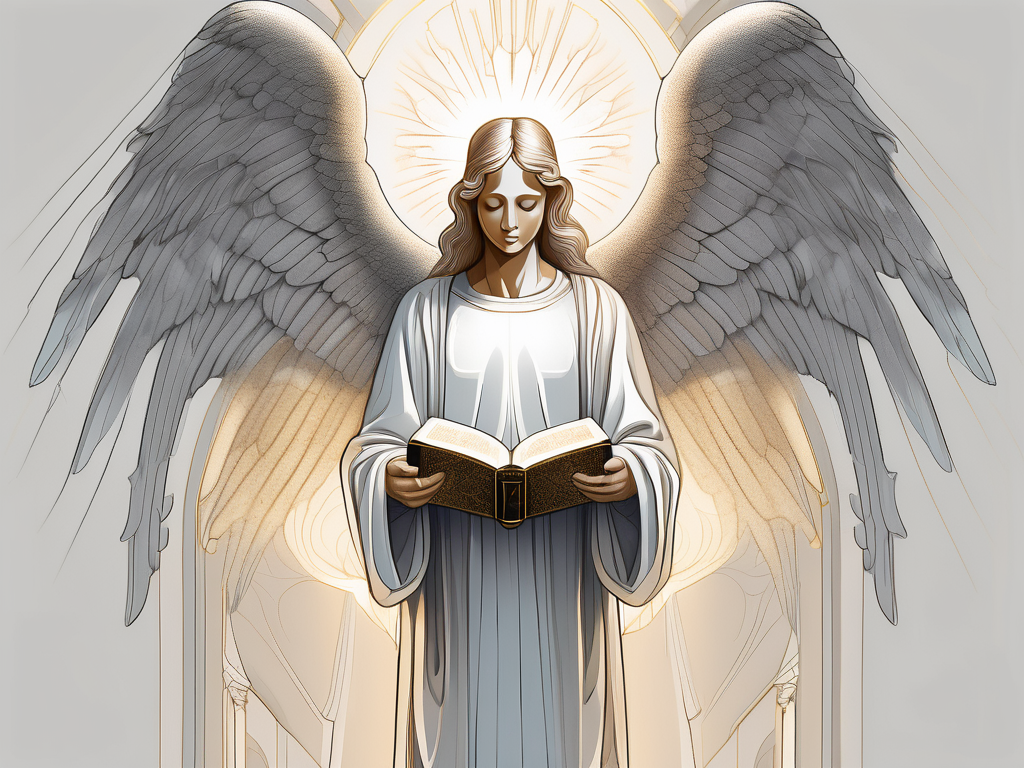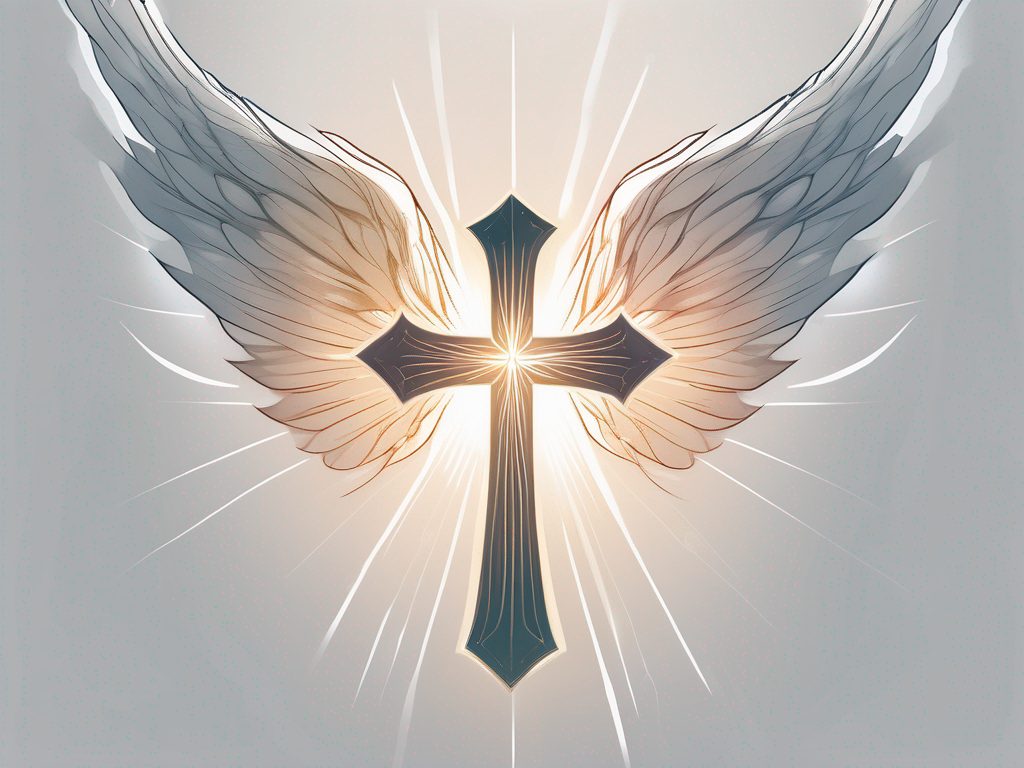Guardian angels have been a topic of fascination and debate for centuries. Many people wonder if these celestial beings exist and what role they play in our lives. In this article, we will explore the concept of guardian angels as depicted in the Bible, examining their definition, purpose, and presence in both the Old and New Testaments. We will also delve into theological interpretations of guardian angels and address some common misconceptions surrounding them.
Understanding the Concept of Guardian Angels
Before we dive into the biblical references, let’s take a moment to understand what guardian angels are all about. In simple terms, guardian angels are believed to be spiritual beings appointed by God to watch over and protect individuals. They are seen as personal guides, offering assistance, and safeguarding us from harm. While the concept of guardian angels is not explicitly spelled out in the Bible, there are various passages that allude to their existence.
Guardian angels have been a topic of fascination and wonder for centuries. Across different cultures and religions, the belief in these celestial beings has persisted, providing solace and hope to many. The idea of having a divine protector, someone who looks out for us in times of need, is deeply comforting.
Throughout history, there have been countless stories and anecdotes about encounters with guardian angels. People have reported miraculous interventions, where they were saved from accidents, guided to safety, or comforted in times of distress. These personal testimonies serve as a testament to the profound impact that guardian angels can have on our lives.
Biblical Definition of Guardian Angels
Although the term “guardian angel” may not be explicitly used in the Bible, there are several passages that suggest the presence of divine beings charged with the task of watching over God’s people. In Psalm 91:11, it says, “For he will command his angels concerning you to guard you in all your ways.” This verse implies that angels are assigned to protect us and ensure our well-being.
Furthermore, in the New Testament, there are instances where angels play a significant role in guiding and protecting individuals. For example, in the book of Acts, an angel appears to Peter, helping him escape from prison. This demonstrates the active involvement of angels in the lives of believers.
It is important to note that while the Bible does not provide a comprehensive explanation of guardian angels, it does offer glimpses into their existence and purpose. The true nature and extent of their involvement in our lives remain a mystery, inviting us to explore and contemplate the divine mysteries that surround us.
The Role and Purpose of Guardian Angels
So, what is the purpose of guardian angels? According to biblical descriptions, their primary role is to aid and guide believers, acting as messengers between God and humans. They provide comfort, strength, and protection in times of need. However, it’s important to note that guardian angels do not replace human responsibility or free will. They are meant to offer guidance and support, but ultimately, we are still responsible for our choices and actions.
Guardian angels are not limited to a specific function or task. They adapt to our individual needs, offering assistance in various aspects of our lives. Whether it is guidance in making important decisions, protection from physical or spiritual dangers, or simply providing comfort during challenging times, guardian angels are believed to be ever-present, ready to intervene when necessary.
It is comforting to know that we are not alone in our journey through life. Guardian angels serve as a constant reminder of God’s love and care for us. They are a source of hope and inspiration, guiding us towards a path of righteousness and spiritual growth.
Guardian Angels in the Old Testament
The concept of guardian angels can be traced back to the Old Testament, where there are several instances of angelic encounters and divine protection.
Guardian Angels in Genesis
In the book of Genesis, we see angels taking on the role of protectors. One notable example is the story of Hagar, who fled into the wilderness after being mistreated by her mistress. In Genesis 16:7, an angel of the Lord found her by a spring and assured her that God had heard her cries. The angel provided Hagar with guidance and comfort, assuring her of her future and the future of her son.
But the presence of guardian angels in Genesis doesn’t end there. In Genesis 18, we read about three visitors who came to Abraham’s tent. These visitors were no ordinary men, but angels sent by God. They brought Abraham the news that his wife Sarah would bear a son, despite her old age. Not only did these angels bring a message of hope and promise, but they also protected Abraham and Sarah from harm.
Angelic Encounters in Exodus
In the book of Exodus, angels play a prominent role in protecting the Israelites during their journey from Egypt to the Promised Land. When the Israelites were pursued by Pharaoh’s army at the Red Sea, an angel of God went before them, becoming a pillar of cloud by day and a pillar of fire by night, leading them to safety (Exodus 14:19-20).
But the angelic encounters in Exodus don’t stop there. In Exodus 23:20-23, God promises to send an angel ahead of the Israelites to guard them and bring them to the place He has prepared for them. This angel would protect them from their enemies and ensure their well-being throughout their journey. This divine protection was a clear manifestation of God’s love and care for His chosen people.
Another remarkable instance is when an angel appeared to Moses in the burning bush. This encounter signified the beginning of Moses’ role as the deliverer of God’s people from Egyptian slavery. The angel’s presence assured Moses of divine support and guidance throughout his daunting task.
Throughout the Old Testament, we see the recurring theme of guardian angels providing protection, guidance, and comfort to those in need. These encounters with angels remind us of God’s watchful eye and His desire to protect and guide His people. The presence of guardian angels serves as a testament to the divine love and care that God has for His creation.
Guardian Angels in the New Testament
The concept of guardian angels continues in the New Testament, with several instances where angels are mentioned as protectors and messengers.
But what exactly do these guardian angels do? Let’s take a closer look at some of the instances where they are mentioned in the Gospels and Epistles.
Guardian Angels in the Gospels
In the Gospels, we find references to angelic intervention surrounding the birth and ministry of Jesus. When Joseph learned of Mary’s pregnancy, an angel appeared to him in a dream, reassuring him of God’s plan and instructing him to take Mary as his wife (Matthew 1:20-21). This angelic visitation served to guide and protect both Joseph and Jesus.
But the role of guardian angels didn’t end there. During Jesus’ ministry, angels also appeared to strengthen and provide for Him. In Matthew 4:11, after Jesus was tempted in the wilderness, angels came and ministered to Him, offering comfort and support during His time of need.
These instances highlight the important role that guardian angels played in Jesus’ life, ensuring His safety and well-being as He fulfilled His mission on Earth.
References to Guardian Angels in the Epistles
While the New Testament does not explicitly mention guardian angels in the same way as the Old Testament, there are passages that depict angels being sent by God to protect and minister to believers. In Hebrews 1:14, it says that angels are “ministering spirits sent out to serve for the sake of those who are to inherit salvation.” This suggests that angels continue to fulfill their role as guardians and helpers of God’s people.
So, even though the term “guardian angels” may not be explicitly used, the New Testament affirms the presence and involvement of angels in the lives of believers, ensuring their protection and well-being.
It is comforting to know that just as God sent angels to guide and protect Jesus, He also provides us with guardian angels who watch over us, guiding us on our spiritual journey and offering support in times of need.
As we navigate through life, let us remember that we are not alone. Guardian angels are with us, unseen but ever-present, working behind the scenes to ensure our safety and well-being.
Theological Interpretations of Guardian Angels
Throughout history, various theological interpretations of guardian angels have emerged within different Christian traditions. These interpretations shed light on the significance and role of guardian angels in the lives of believers.
Guardian angels have long been a subject of fascination and devotion, particularly within Catholicism and Protestantism. These interpretations offer unique perspectives on the nature and purpose of these celestial beings.
Catholic Views on Guardian Angels
In Catholicism, belief in guardian angels is deeply rooted and holds a prominent place in the faith. The Catechism of the Catholic Church states that “From its beginning until death, human life is surrounded by their watchful care and intercession” (CCC 336). This belief underscores the idea that guardian angels are assigned to individuals from birth until their last breath.
According to Catholic teaching, each person is assigned a guardian angel whose task is to guide, protect, and intercede for them. These celestial beings are seen as messengers of God’s love and providence, offering comfort, guidance, and protection in times of need. They are believed to be intimately involved in the spiritual journey of individuals, offering assistance and support in their pursuit of holiness.
Devotion to guardian angels is a significant aspect of Catholic spirituality. Many Catholics pray to their guardian angels, seeking their guidance and protection in their daily lives. The feast day of the Guardian Angels, celebrated on October 2nd, serves as a reminder of their presence and the role they play in the lives of believers.
Protestant Perspectives on Guardian Angels
Among Protestants, views on guardian angels may vary. While some embrace the concept of individual guardian angels, others may view the idea as less prominent. However, many Protestants still believe in the general presence and protection of angels as depicted in the Bible.
Protestant perspectives on guardian angels often emphasize the biblical accounts of angelic intervention and protection. They acknowledge that angels are spiritual beings created by God, who serve as messengers and agents of His divine will. While the idea of individual guardian angels may not be as emphasized, the belief in the presence and activity of angels in the lives of believers remains significant.
Protestant Christians often draw inspiration from biblical passages that speak of angelic encounters and divine protection. These passages serve as a reminder of God’s care and watchful presence in their lives, even if the concept of individual guardian angels is not as explicitly emphasized.
Regardless of the theological nuances and variations within different Christian traditions, the belief in guardian angels reflects a deep-seated desire for divine protection, guidance, and intercession. It is a testament to the belief in a loving and caring God who provides celestial beings to accompany and support believers on their spiritual journey.
Common Misconceptions About Guardian Angels
With the topic of guardian angels comes a fair share of misconceptions. Let’s debunk some of the most common ones and gain a clearer understanding.
Debunking Myths About Guardian Angels
Contrary to popular belief, guardian angels are not meant to grant every wish or shield us from all harm. They are not our personal genies or superheroes. Instead, their purpose is to guide and protect us within the context of God’s will.
What the Bible Doesn’t Say About Guardian Angels
While the Bible provides glimpses into the existence and role of guardian angels, it does not offer a comprehensive guide outlining their specifics. Questions about how many guardian angels each person has or what form they take remain unanswered. The Bible focuses more on the relationship between God, angels, and humanity rather than providing a detailed account of guardian angel mechanics.
In conclusion, the Bible offers insight into the concept of guardian angels, portraying them as divine beings assigned to watch over and protect us. Their role involves guiding, comforting, and providing aid in alignment with God’s will. While the Bible does not provide an exhaustive account of guardian angel specifics, it affirms their existence and their purpose within the broader narrative of divine intervention and guidance. Whether one embraces the idea of guardian angels as personal protectors or believes in the general presence of heavenly beings, the concept serves as a reminder of God’s love, care, and involvement in our lives.












